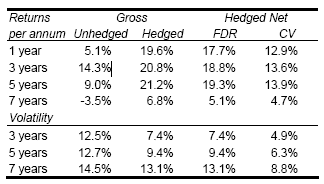 Over the seven year period, FDR delivers an additional annual return of 5.1%.
Over the seven year period, FDR delivers an additional annual return of 5.1%. By applying it to the results of global share and bond over the past seven years.
Under the previous tax regime all the gain or loss in global share funds were subject to tax. But now under the FDR regime, just 5% of the value of the investment is subject to tax.
MJW says a question exists about the tax basis of currency hedging and in this exercise it has assumed that any hedging losses or gains are taxed under the current CV basis.
The main conclusion MJW comes up with in the share sector is that under the FDR regime returns are expected to be higher, albeit it with more volatility.
 Over the seven year period, FDR delivers an additional annual return of 5.1%.
Over the seven year period, FDR delivers an additional annual return of 5.1%.
MJW says that this is "a surprisingly low result, but heavily influenced by two initial bad years results."
It also notes that while the regime "delivers higher positive results, when the market is negative the net FDR result is substantially worse than the net CV result."
This negative net FDR result is lower than the gross result due to the fact that tax is paid irrespective of the return achieved.
MJW says there is a similar result from its analysis of global bond funds, namely the returns under FDR are better, but more volatile.
It says on an historical basis it is quite clear that investors should go for the FDR regime.
While the volatility is higher it is "not particularly so".
Looking back over the seven year period there is no one year result where an investor would be better off under the CV regime.
MJW says while FDR is favoured it appears many of the international bond funds are being taxed under the CV regime in total and others are invested in Australian unit trusts which are subject to FDR. However, the Australian dollar hedge is subject to the CV regime.
It says the latter funds have an advantage of around 40 basis points, net, annually over the former.
| « News Round Up | Sovereign takes regulation bull by the horns » |
Special Offers

© Copyright 1997-2026 Tarawera Publishing Ltd. All Rights Reserved